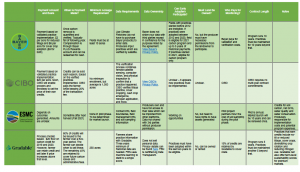Conservation, Homepage Slider, Specialty
SoyOhio.Org and Carbon Market Information
By Dusty Sonnenberg, CCA, Ohio Field Leader, a project of the Ohio Soybean Council and soybean check-off.
Carbon Markets are being promoted everywhere in agriculture. They are advertised on the internet, in farm publication, and through major ag retailers. This has not gone unnoticed by many Ohio farmers interested in diversifying their revenue sources. At recent board meetings of The Ohio Soybean Council and the Ohio Soybean Association, carbon market opportunities were a central discussion point. Soybean producers in Ohio are represented by farmers board members on the Ohio Soybean Council, which is the managing arm of the Soybean Check-off program, and the Ohio Soybean Association, which is the policy arm. A joint committee was created from both boards to further explore carbon market opportunities for Ohio’s soybean growers.
“Direction from the joint committee to Ohio soybean staff members was to explore carbon, think through what options are available to farmers, and what do farmers need to know about these programs to make an informed decision,” said Julia Brown, Communications Manager for the Ohio Soybean Council and Ohio Soybean Association. “In that process, we discovered that there is no one stop shop for all this information.”
The joint committee instructed the Ohio soybean staff to pull together all the available information on carbon markets for Ohio farmers and organize it in a user friendly and meaningful way. “It took us about two weeks to gather all the information and organize it in a uniform format,” said Brown. “A farmer doesn’t have two weeks to spend investigating each of these programs individually. We wanted to create a one-stop-shop where they could go to get the information, they need to make an informed decision whether or not to join a carbon market program.”
The website has been created to act as a clearinghouse for all the available carbon market information and simplify the comparison process for Ohio farmers. The information is available by visiting www.soyohio.org and clicking on the “Carbon Markets” tab at the top.
The website is organized with four key sections. The first is a glossary of terms with words and phrases that may be unfamiliar to farmers when it comes to carbon markets. Second is a frequently asked questions (FAQ) section. “Those are questions that we felt comfortable answering as a third party,” said Brown. “They are questions that came out of the joint committee that the board members had about carbon.”
The third section on the website is a list of questions a farmer should ask before enrolling in a carbon program. “Those are questions farmers need to be asking of these programs and of the brokers to make sure they are getting the best contract for their operation and know exactly what they are signing up for if they choose to enroll.”
The fourth section is a chart that compares all the programs the staff were able to find available to farmers in Ohio. This is updated regularly as programs change and new programs become available.
The final section is a list of web links to the various programs available for more specific program details.

“There are several reasons why farmers should consider carbon market opportunities,” said Steve Reinhard, Ohio Soybean Council and United Soybean Board member. “Worldwide there is enthusiasm in sequestering carbon. On thing we have been doing at the Ohio Soybean Council and United Soybean Board is try to quantify how we are sequestering carbon and producing a sustainable soybean that can be sold to other countries that are interested in purchasing beans that were produced in a sustainable way.”
Carbon markets have an integral fit in environmental sustainability. “The carbon market is one way that we can look at producing a sustainable product, and it provides a possible revenue source for individual farms, if they choose to participate in different practices that are being promoted by several carbon market programs,” said Reinhard. “Just as we saw many difficulties exporting soybeans to China in the past, we were able to develop soybean markets in European Union because of our sustainability. Those are markets we would like to keep.”
“While the carbon market may not be for everyone, there are several reasons why a farmer should at least consider participating in the carbon markets,” said Reinhard. “It may be additional revenue for your farm; the desire to grow a sustainable product; or having another company purchase the carbon credits so that they can offset their carbon footprint and are appear more consumer friendly.”